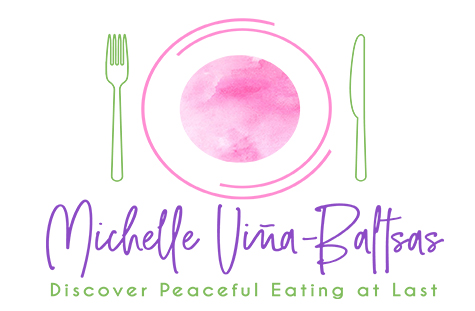When you hear the words “self-compassion”, what immediately comes to mind? If you’re anything like I was when I was first embarked on my intuitive eating journey, and like an overwhelming majority of my clients are when they first start coaching with me, you squirm. Before we go any further, I’d like to share how self-compassion is defined by renowned self-compassion researcher Dr. Kristin Neff:
“Self-compassion entails being warm and understanding toward ourselves when we suffer, fail, or feel inadequate, rather than ignoring our pain or flagellating ourselves with self-criticism.”
To most, the concept of being self-compassionate is foreign. I’ve found this to be especially true regarding those who struggle with eating challenges. I often remember thinking, “Why would such self-destructive behaviors deserve kindness when I’m doing such harm to my body and emotional health?” At the time, I believed that extending kindness to myself would perpetuate these behaviors. Since I didn’t want the behaviors to continue, I assumed that beating myself up was the way to stop them from continuing. I often hear the similar thoughts from my clients.
In fact, the opposite is true. Dr. Kristin Neff’s research shows that being hard on oneself usually backfires. It prevents people from facing the difficult truths about their behaviors or beliefs because they are so afraid of hating themselves if they do. This often allows weaknesses or patterns to remain unacknowledged. Because of this, change is unlikely to occur and even if it does, it will likely take longer and be more difficult to implement and sustain. On the contrary, based on Neff’s research, cultivating a self-compassion practice can provide a powerful motivating force for growth and change while providing a safe place to land without the fear of self-hatred.
Over time, we can begin to heal our relationships with food by curiously, non-judgmentally and compassionately identifying our triggers, patterns and beliefs. Unlike what diet culture preaches, a healthy relationship with food cannot be achieved by eating “clean”, starting a new “lifestyle” plan, or by cleansing/detoxing. True healing takes time, patience and the desire to try different instead of trying harder at the same old thing.
While some are aware of their distressing eating patterns and behaviors, because they are observing them with disgust and shame, it makes it harder to discover the peaceful and healthy relationship with food they deserve to have. Also, that harsh judgment often leads to poor mental health which may eventually diminish a person’s physical health. It’s also important to mention that if diet culture didn’t assume that people in smaller bodies and lower weights are healthy (typically based on BMI scales) and praise one body type/shape over another making so many feel inadequate and unattractive, most wouldn’t diet to try to meet these unrealistic expectations in the first place!
How could your diet recovery change if you began to cultivate a more compassionate eating practice? I’m sure you’re thinking, “In theory that makes sense, but I’ve no idea where to begin!”. To help you get started, I’ve included six tips that I often share with my clients that may help you to develop and grow your own compassionate eating practice:
1. Sit down to eat without distractions: I understand that the demands of everyday life often drive us to eat on the run. That doesn’t do much for our digestion or for our intuitive eating practice. Whenever possible, make a concerted effort to stop, sit and eat without checking email, your social media feed or talking on the phone. When you do this, it gives you some precious time to reconnect with your body. When we are connected to our bodies, we are more likely to make more deliberate eating choices and find more satisfaction in our food. In addition, the simple act of slowing down and minimizing distractions gives your body the message that it’s deserving of that kindness and peace if only for a short while.
2. Minimize guilt around food choices or overeating: When you eat a food that you deem as “unhealthy”/“bad” or when you eat past fullness, kindly say to yourself, “For the most part I eat nourishing foods.” and “For the most part, I eat to fullness.” Diet culture enforces strict rules around the types of foods we should (see tip #3) eat and around how much we should be eating not taking into account our individuality. Healing a relationship with food requires that you start to move away from those strict external rules and become a normal eater.
3. Stop “shoulding” yourself: One of the foundations of self-compassion is continually asking yourself what you need in that moment. So, instead of “shoulding” yourself to eat _____ because it’s “healthy”, ask your body what it needs to feel nourished, satisfied and energized, trusting that you can rely on it to guide you. This will help to instill body trust and that’s how you cultivate a healthy relationship with food and body.
4. Eat now to avoid bingeing later: Along the same lines as tip #3, once you’ve decided what you want to eat, allow yourself to eat it until you’re satisfied or else you may binge on the fear/”trigger” food or on some other food later. Physical and/or emotional food restriction typically leads to binge eating and feeling “out of control” around food.
5. Eat with knowledge: When you eat a food that typically doesn’t agree with you, observe it without judging your actions. Ask yourself questions like, “Would I choose to feel this way again?” or “What other food could I have eaten instead and still felt satisfied? or “Would eating fewer bites of _____ food help me to feel better next time?” The primary goal here is to identify if it’s a specific food that is causing the discomfort or the amount of food eaten.
6. Acknowledge your progress: It’s encouraging to acknowledge when we do something that makes a positive impact in our lives. Take the time to acknowledge yourself for all you’re doing to improve your compassionate eating practice and in turn your relationship with eating. Occasionally, take time after meals to notice if you’re feeling more relaxed and less self-critical about your eating. It’s likely that the more you begin to acknowledge these seemingly small, self-compassionate acts, the more skilled you will become in your compassionate eating practice.
These are just a few ideas so you can get started. Of course, you are the expert on you so if you can think of some other ideas on how to cultivate your compassionate eating practice, go for it! I’m confident that with time, patience and more self-reflection, your relationship with food will begin to transform for the better.
If you're tired of battling with your weight, fed up with the cycle of yo-yo dieting, and yearning to be free from your obsessive thinking about food and your body, schedule your complimentary Embrace Anti-Diet Living Connection Session.
We’ll get clear on where you are now, what you want instead, and what might be getting in the way of your success.
I’ll also share some powerful recommendations and resources to get you started on creating a peaceful relationship with your body and food.


